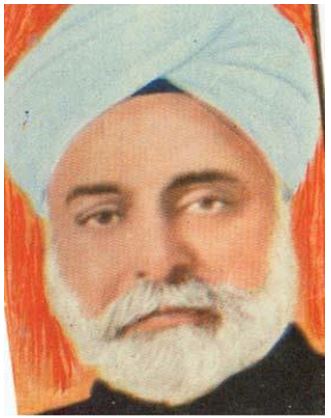MAHTAB SINGH, SARDAR BAHADUR

Sardar Bahadur Mahtab Singh (1879 – 23.5.1938), son of Bhai Hazura Singh and Mata Karam Kaur, was born at village Handali (district Shahpur, Pakistan). After his early education at Lahore, he went to England to study Laws. After his return he started legal practice at Shahpur. In 1910, he was appointed as the public prosecutor at Firozpur. Later, he was transferred to Lahore. Here, in recognition of his services to the British regime, he was granted the title of Sardar Sahib in 1915 and, later, Sardar Bahadur in 1918. After the enforcement of Indian Act of 1919, the first elections were held in Punjab. He was elected as a member of the Punjab Council. In 1920, he was elected the Deputy President of the Legislative Council. When Mahant Narain Das killed more than 130 Sikhs at Nanakana Sahib, on February 20, 1921, Bhai Uttam Singh sent telegrams to Mahtab Singh and informed him about the massacre. Mahtab Singh informed the British officials as well as the Sikh leaders. A special train left Lahore for Nanakana Sahib. Mahtab Singh, Amar Singh of Sher-i-Punjab, Bhai Sunder Singh Chawla, Bhai Harnam Singh Atariwala and Bhai Lal Singh Saudagar and Bhai Gurbakhsh Singh joined the senior Government officials. Sardar Bahadur Mahtab Singh was nominated as the chief of the inquiry committee. When Mahtab Singh found that Mr. Bowring, the superintendent police, was acting in prejudice against the Sikhs, he resigned from the Committee and informed the public about the situation. On November11, 1921, he resigned deputy president-ship as well as the membership of the Council and joined the Sikh struggle. His first arrest was during the “Keys’ Affair” agitation (November 1921 – January 1922). He was sentenced to six months’ imprisonment along with a fine 1000 rupees. He was again arrested during Guru-Da-Bagh agitation on September 14, 1922. On October 12, 1923, when the Akali Dal and the S.G.P.C. were declared as unlawful organisations, he was arrested again. In 1926, some Sikh leaders accepted conditional release from jail; Mahtab Singh was one of them. This affected his reputation a lot. In January 1926, he was elected as the president of the S.G.P.C. because the senior leaders were still in jail He continued to be in this office till the elections were held under the official Gurdwara Act were held, in June 1926. Mahtab Singh lost elections and Kharak Singh became the president of the S.G.P.C. In 1928, he participated in the movement for boycott of Simon Commission. Mahtab Singh was very vocal when the Nehru Report (on the issue of communal representation) was published. This Report had done great injustice to the rights of the Sikhs. An All Parties Conference was held at Calcutta, in December 1928. Speaking at the Conference, Mahtab Singh warned Gandhi and Nehru, “if you ignore the Sikhs, the partition of India will not be made on papers, it will be decided by sword”. Mahtab Singh was also one of the major leaders of the Sikh League. He played effective role during the agitation launched to oppose of the Communal Award (1932). By that time Akali Dal had become a divided house. Baba Wisakha Singh Dadehar tried to mediate but with partial success. During the S.G.P.C. elections (in 1936), Mahtab Singh was among the few senior leaders, who had been granted a seat by Baba Wisakha Singh Committee; while several others were rejected. He won his seat, though the president-ship of the S.G.P.C. went to Master Tara Singh. In 1938, Sardar Bahadar Mahtab Singh died of heart attack, while pleading a case in the High Court at Lahore.
(Dr Harjinder Singh Dilgeer)